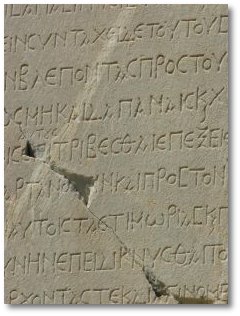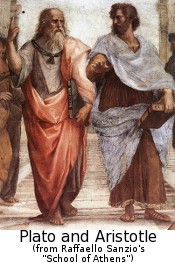Why Do (Some) Seminaries Still Require the Biblical Languages?
 The following is reprinted with permission from Paraklesis, a publication of Baptist Bible Seminary. The article first appeared in the Summer ‘09 issue.
The following is reprinted with permission from Paraklesis, a publication of Baptist Bible Seminary. The article first appeared in the Summer ‘09 issue.
Why learn Hebrew and Greek?
I want to address just one facet of the question in this essay. The primary purpose of Baptist Bible Seminary is to train pastors. We have made a deliberate choice to focus on only one narrow slice of graduate-level biblical-theological education. I am thinking first and foremost of the pastor when I think of the place of the biblical languages in the curriculum. In its biblical portrait, the central focus in pastoral ministry is the public proclamation of the Word of God. There are certainly other aspects of pastoral ministry, but it can be no less than preaching if it is to be a biblical pastoral ministry.
How does preaching relate to the biblical languages?
I have some serious concerns about the state of the pulpit these days. My concern could be stated fairly well by adapting the wording of 1 Sam. 3:1 and suggesting that biblical preaching is rare in our day, and a word from God is infrequently heard from our pulpits. Some of today’s best known preachers echo the same sentiment. John Stott, for example, says that “true Christian preaching…is extremely rare in today’s Church.”1
As those who stand in the pulpit and open the Word of God to a local congregation, pastors have the same charge as that with which Paul charged Timothy: “Preach the Word” (2 Tim 4:2). That is an awesome responsibility. The apostle Peter reminds us that “if anyone speaks, he should do it as one speaking the very words of God” (1 Pet 4:11).
Discussion
Shall We Cast Lots? Identifying "Biblical Patterns"
 (First published at SI, June 6, 2006)
(First published at SI, June 6, 2006)
Pitfalls in the Pursuit of Biblical Patterns
In Scripture, casting lots is routine. Some might even say it’s the normal way to decide a difficult question. The OT 1 contains 24 references to “cast lots,” “casting lots,” and “the lot fell.” Two of these are in Proverbs where lot-casting is highly recommended.
The lot is cast into the lap, but its every decision is from the Lord (Prov. 16:33).
Casting lots causes contentions to cease, and keeps the mighty apart (Prov. 18:18).
In addition, the Urim and Thummim (probably a form of lot-casting) have a prominent place in Mosaic Law. All in all, the OT is very pro-lot.
The NT seems to be in favor of the practice as well. Casting lots is mentioned there eight times, and one of them refers to the selection of an apostle to replace Judas (Acts 1:26). So if we have frequent favorable references to lot-casting across both Old and New Testaments, do we have a “biblical pattern”? Should we be casting lots in our churches rather than voting? After all, the Bible contains no direct command to vote on anything (some might argue that voting is the brainchild of humanistic philosopher Jean-Jacques Rousseau and his ilk).
Discussion
Preservation: How and What? Part 2
 Read Part 1.
Read Part 1.Fundamentalists and conservative evangelicals believe God has preserved His word. The debate among them is mainly over the manner of preservation and the form the preserved word has taken. Some believe we have a God-preserved, word-perfect text we can identify with certainty. Others believe we do not.
Those who hold to identifiable, word-perfect preservation cite several passages in support of their doctrine. Part 1 of this series examined several of the strongest of these to see what they they actually teach.1 I concluded that these passages lead us to believe God will preserve His word perfectly in a form that is at least potentially discoverable, but that they do not promise that God’s people will always be able to point to a particular manuscript or text and confidently claim it is the word-perfect, preserved text.
Others have examined these passages (and others) and come to very similar conclusions (Moritz, 86-88; Beacham and Bauder, 116-123; Williams and Shaylor, 83-111), and defenders of certainly-identifiable, word-perfect preservation have responded with counterarguments and accusations. Many of these obscure the real issues in the debate and attempt to frame it in a way that heavily favors their view.
Discussion
The Perspicuity of Scripture as Applied to Bible Translation, Part 2
 Read Part 1.
Read Part 1.
The doctrine of perspicuity or clarity of Scripture can be stated this way: All things being accounted for, the Scriptures are understandable. The question is, however, what should be accounted for?
Discussion
The Perspicuity of Scripture as Applied to Bible Translation, Part 1

The essential characteristics of the Scriptures may be summed up in these tenets: revelation because God has communicated His mind to men; inspiration because God has superintended the recording of what He communicated; canonicity because what is inspired is recognized; infallibility because what God intended to be written was recorded without error; authority because what is recorded is binding upon all men; necessity because man cannot do without what God says; sufficiency because what God has communicated needs no supplement; preservation because God has pledged for His Word to exist to all generations; and understandability because God communicated in order to be understood.
While all these characteristics of the Scriptures are essential and significant, two of them relate directly to the routine task of the Bible translator: preservation and understandability. The other characteristics may impress the translator with the sacredness and value of the biblical texts and shape his philosophy of Bible translation, but they do not directly affect the routine, technical work of translating. They are inherent qualities that are set and permanent but are not active, so to speak.
By contrast, whenever the Scriptures are translated into a new language, preservation is newly active. And whenever the Scriptures are studied, preached, or translated, understandability is also in operation. Both preservation and understandability of the Bible are acts of “fairness” from God. It would not be equitable that God would reveal His Word, render it binding upon all men, and then not make it available; or that He would make it available and not make it understandable.
Discussion
Preservation: How and What?
 The doctrine of preservation of the Scriptures has been hotly debated in recent years. Much has been written and said, but most of the rhetoric on the subject has been closely connected to defending or rejecting one view or another on the translation issue. The result has often been that important foundational questions have been overlooked in a rush to get to conclusion A or B in the translation debate.
The doctrine of preservation of the Scriptures has been hotly debated in recent years. Much has been written and said, but most of the rhetoric on the subject has been closely connected to defending or rejecting one view or another on the translation issue. The result has often been that important foundational questions have been overlooked in a rush to get to conclusion A or B in the translation debate.
Among the neglected questions are these: (1) what process did God say He would use to preserve His word and (2) what form did He say that preserved word would take? Both of these are subsets of another neglected question: What does Scripture actually claim (and not claim) about it’s own preservation?
The questions of process (“how”) and form (“what”) are at the heart of the controversy because nobody (among fundamentalists or conservative evangelicals) denies that the word has, and will, endure. The question of what Scripture actually claims is critical as well, for multiple reasons. For one, only a clear answer to that question can put us on the right track to answering the others.
Two general schools of thought exist regarding the how and what of preservation.
Discussion
Q & A With Dr. Warren VanHetloo
 Compiled from Dr. Warren VanHetloo’s “Cogitations” October 13-21, 2009.
Compiled from Dr. Warren VanHetloo’s “Cogitations” October 13-21, 2009.Question
Dr. Van, In looking at the history of the Bible as we know it today, there seems to have frequently been a distrust of the laity to handle (understand) the Word of God. Obviously, only the more wealthy people were able to provide enough education so they could read or teach their children to read. But beyond that, religious leaders seemed reluctant to open the door to the common person to use the Bible in a way to gain understanding about God’s Ways. We look back and say that there were issues of power, politics, etc. But even today in Bible believing churches, you can hear home study groups described as “shared ignorance.” Not too many decades ago, home Bible study groups were publicly discouraged, often from the pulpit. It is almost as if there is fear among the Bible believing pastors that the dangers far outweigh the benefits (or at least threaten their authority). Small groups have become a bit of fad recently, but to deny their potential in spiritual growth, in spite of some risk, seems to underestimate the ability of the Holy Spirit to work through the Word in the hearts of people. What is your evaluation?
Discussion
Philosophers and Children

My doctoral studies during the past several years have been quite a challenge, since I have been forced to study (with good comprehension) many ideas and disciplines that were somewhat new to me. The thinking and writing of lots of theologians and philosophers is anything but simple. Take, for example, this explanation of man’s existence by Paul Tillich:
Discussion
Confidence in the Word, Part 2
 The church at Colosse apparently had come under the influence of the early stages of Gnosticism. Gnostics taught that certain individuals were privy to mystical sources of knowledge beyond the Scriptures. If one wanted to move on to maturity, according to the Gnostics, he had to tap into this extra-biblical knowledge through the methods that they taught. The Colossians, under this influence, were leaving behind the apostolic instruction concerning the Christian life (vv. 1-7) and were being deluded into adding at least five things to God’s Word.
The church at Colosse apparently had come under the influence of the early stages of Gnosticism. Gnostics taught that certain individuals were privy to mystical sources of knowledge beyond the Scriptures. If one wanted to move on to maturity, according to the Gnostics, he had to tap into this extra-biblical knowledge through the methods that they taught. The Colossians, under this influence, were leaving behind the apostolic instruction concerning the Christian life (vv. 1-7) and were being deluded into adding at least five things to God’s Word.
Philosophy
Colossians 2:8-15 warns of the danger of being taken captive through philosophy and empty deception. “Philosophy” means the “love of wisdom” and the book of Proverbs tells us that the love of wisdom is a worthy pursuit (Proverbs 4:6). God does not oppose wisdom; He is against the wrong kind of wisdom. Paul warns of a pseudo-wisdom that can be identified by three characteristics:
• It is according to the traditions of men. That is, wisdom that comes from the mind of men, not the mind of God.
• It is according to the elementary principles of the world. This is likely a reference to the attempt to gain esoteric knowledge through mystical means, something the Gnostics loved (see v. 18).
• It is not according to Christ. True wisdom is found in Christ “in whom are hidden all the treasures of wisdom and knowledge” (v. 3). The Colossians were searching in the wrong place for wisdom. What they were looking for was found in Christ, through the Word, not in the philosophies of men.

Discussion